The Karnataka government told the Supreme Court on Wednesday that the state has not touched any "religious aspect" in the hijab ban row and that the restriction on wearing the Islamic headscarf is limited to the classroom.
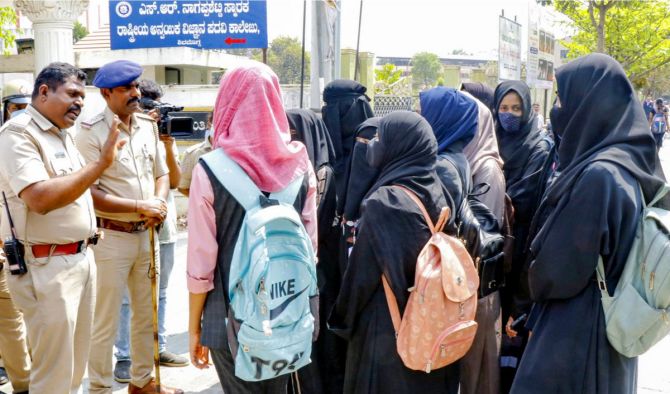
The state government said there does not exist a ban on the hijab even beyond the classroom on the campuses. It's counsel emphasised the state has only said educational institutions can prescribe uniform for students, something which is "religion neutral".
Karnataka's advocate general Prabhuling K Navadgi told a bench of Justices Hemant Gupta and Sudhanshu Dhulia that countries like France have prohibited the hijab and the women there have not become any less Islamic.
Navadgi said unless it is shown that wearing the hijab is compulsory and an essential religious practice (ERP), one cannot get protection under Article 25 of the Constitution, which deals with freedom of conscience and free profession, practice and propagation of religion.
"We do not place restriction on wearing the hijab outside school. There is no restriction even in the school campus. The nature of restriction is only inside the classroom," the advocate general told the bench.
The top court was hearing arguments on a batch of pleas challenging the Karnataka high court verdict refusing to lift the ban on hijab in educational institutions of the state.
Additional solicitor general (ASG) K M Nataraj, who also appeared for the state, said the petitioners' entire case is based on a right which they claim is an absolute right.
"Let me make it very clear at the beginning. The state has not touched any religious aspect or religious issue. Much hue and cry is made by saying that the hijab is banned. Let me clarify, hijab is not banned and the state never intended (to impose one) as such," the ASG said, adding that the school is a secular place.
He asserted the state has neither prohibited nor promoted any religious activity.
"You will not permit them if they wear the hijab?" the bench asked the government lawyer.
The ASG responded by saying the state's decision is not based on any religion and it only says educational institutions can prescribe the uniform.
"Will you permit a girl wearing a hijab inside the school, yes or no?" the bench persisted with its query.
Nataraj replied that the school concerned will have to decide depending upon the uniform they have prescribed.
During the hearing, Navadgi also argued on the aspect of ERP.
"The question would be, even if we presume that it (the hijab) is not an essential religious practice, then what kind of practice it is and to what extent the court can go into it," the bench asked.
The advocate general, who referred to a previous verdict delivered by the apex court, argued that every activity related to religion cannot necessarily be called an essential religious practice.
"Today, we have a large number of sisters and mothers belonging to the Islamic faith who do not wear the hijab, who as a matter of their choice do not wear the hijab.
"We have countries like France which have prohibited wearing of hijab. But in both these situations, when a woman does not wear the hijab, she does not become any less Islamic," Navadgi said, adding that Islam continues to flourish in countries which have banned the hijab.
Justice Gupta noted he knows a former judge of the Lahore high court who used to visit India with his family, including his two daughters, and they did not wear the hijab.
"I can share one thing. I know somebody in Pakistan, a former judge of the Lahore high court, who used to visit India quite often along with his family. He has two daughters and a son and I have never seen these young girls and the mother wearing the hijab, at least in India," Justice Gupta said.
The bench observed that arguments raised on behalf of the petitioners is that whatever is mentioned in the Holy Quran is mandatory and sacrosanct.
"We are not experts in Quran. But this court in at least three instances have said every word in the Quran may be religious but not essentially religious," Navadgi said while referring to some previous verdicts of the apex court.
He denied the submissions advanced by the petitioners' counsel that the state has acted against one community.
"We have lots of material to show to your lordships the kind of schemes and programmes the government has for minority children," the advocate general said.
Senior advocate R Venkataramani, who appeared for a teacher, said they want a free and unhindered atmosphere where teachers can communicate with the students without a wall of separation.
"Hijab creates a wall of separation?" the bench asked.
Venkataramani said schools must be essentially free from all these elements where even a slightest distraction will be an impediment in free transmission of knowledge.
The bench observed there could be a different perspective where a teacher may say: "This is an opportunity. Look at this diverse country, we have students of all cultures, all religions, be culturally sensitive towards them."
"There are students who are very soon going to get out of the school walls and they will be facing the world in this rich and diverse country. In a way it is an opportunity to inculcate some values. That can be a perspective," the court said.
The arguments will continue on Thursday.
The state government had, by its order of February 5, 2022, banned wearing clothes that disturb equality, integrity, and public order in schools and colleges. The order was challenged by some Muslim girls in the high court.
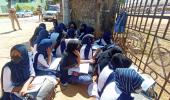
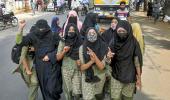
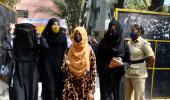
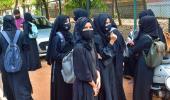
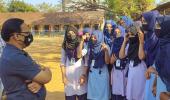



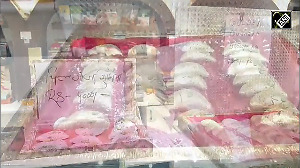
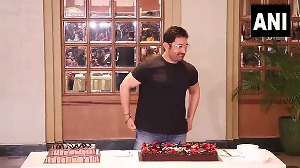
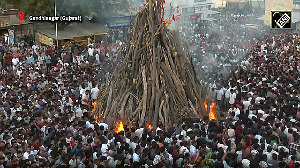
 © 2025
© 2025